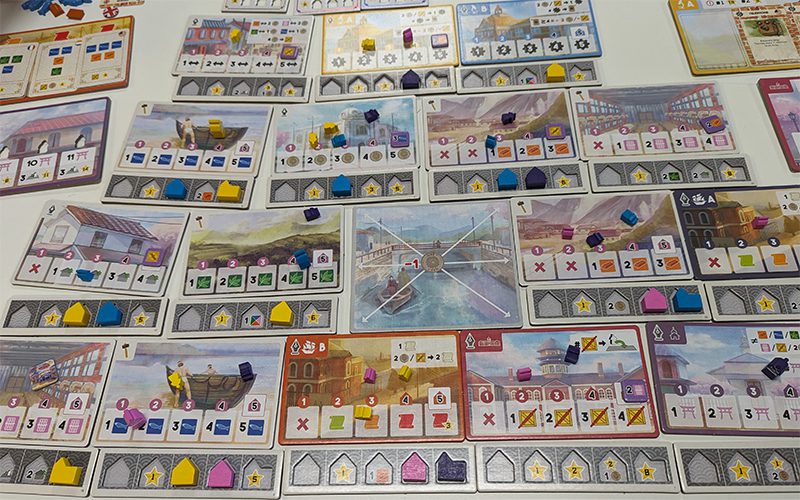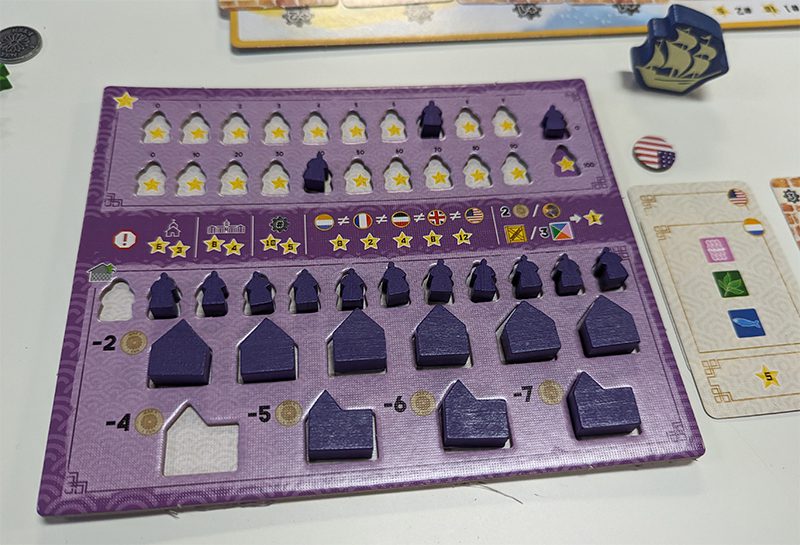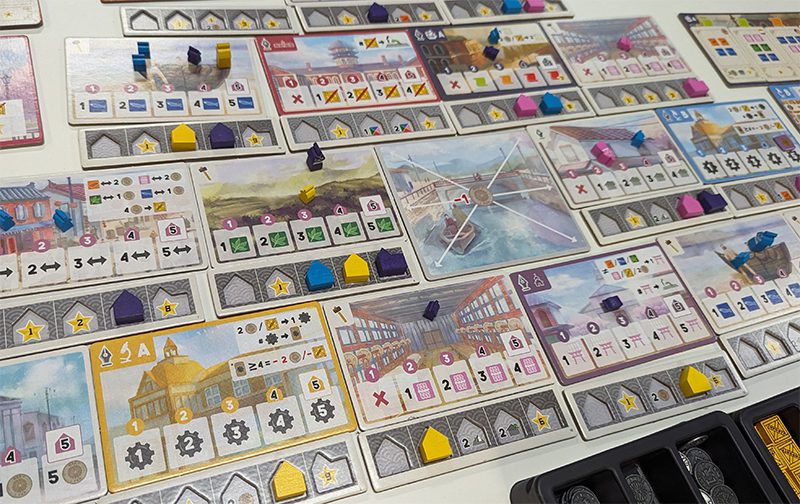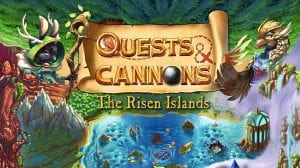Disclosure: Meeple Mountain received a free copy of this product in exchange for an honest, unbiased review. This review is not intended to be an endorsement.
Typically, reviews of game reprints follow a predictable pattern. The author reminisces about their experience with the original edition or argues that it was an overlooked masterpiece. It’s a bit cliche and it works for the most part. I know this because I do this. However, in this instance, I’m unable to follow suit since I never had the opportunity to play the original version of Yokohama.
As shallow as this sounds, the only reason I never played the older edition is the graphic design. The original box cover art felt claustrophobic and the view looked like you were thrown down in an oddly shaped well. When I saw it at board game meetup groups, it didn’t bolster my confidence. Cards littered all over the table and the detritus of wooden cubes was simply too much.
After playing the newer edition a few times for this review, I must confess and say that I missed out. This is a great game that easily sits next to fantastic titles like Concordia and Puerto Rico. It’s the next step after being pampered by the starter trio of Carcassonne, Ticket to Ride, and Catan. Like any other game, it’s not perfect, but does far more right than wrong.

Setting Sail
With that admission out of the way, let’s get into what makes this game tick. At its core, Yokohama is a pickup-and-delivery game about filling orders, grabbing tech, and harvesting resources. It is the beginning of the Meiji era and the city of Yokohama is at the frontlines of foreign trade. You are a merchant during this prosperous period and you want to outperform your friends.
To aid you on this journey, you have a small militia of assistants, the President, a few Shops, and two starting order cards. At the start of your turn, you have two choices for deploying your assistants: you can either distribute three across three separate areas of your choosing, or concentrate two in a single area. If you want to place an assistant in the same location as another player’s President, and you need to pay one yen to the other player.
After placing your assistants, your President moves. The President’s movement is limited to areas where you’ve stationed assistants and if you move through any other player’s President, you also need to pay that player one yen.
Wherever the destination lies, that area activates. The number of pieces you have there, meaning your assistants and President, determines the “power” that influences your output of the area’s power. In simple terms, the more power, the more stuff you get.
Navigating the Harbor
This sounds quite straightforward, and that’s because it is, but there are bits of complication under these innocent rules. When you activate a location with at least four power, you unlock the opportunity to establish either a Shop or a Trading House in that area. These structures offer more than just immediate benefits; they also grant you an additional power point whenever you utilize that area for the remainder of the game. Trading Houses prove particularly valuable, as they reward you with one yen each time another player makes use of that location.
That’s simply it in terms of a turn flow, but there are some extra areas to be concerned about. There is a Customs and Church board where you need to sacrifice resources to permanently place an assistant on these boards. Like the Shops and Trading Houses, they give an immediate perk yet possibly provide end game bonuses if you have the majority of assistants on these two boards. There are also Technology cards that break rules, from the Tram making movement trivial to a Winery that provides bonus points each time you send an assistant to Church.
There is even a form of set collection for end game scoring. Every order and technology card has a country icon. You score a respectable number of points if you have unique sets of cards, but if you happen to have a pair of country cards, you get a foreign agent. These foreign agents are in limited supply and activating one is similar to activating your President, essentially giving you an extra turn.

Foreign Influences
Now if this sounds like a game of the “point salad” variety, I ain’t going to argue because that’s exactly what’s going on here. Usually I would respond to such a design with the roll of the eyes, a loud sigh, followed by a slap on the forehead. I can’t do that here because while there are numerous ways to score points, they are quite interconnected and pursuing them often helps you in other ways.
If anything, this is the greatest strength of Yokohama in the conventional pickup and delivery sphere. While many games in this genre tend to confine players to a singular, rigid path with little room for deviation from the primary objective, Yokohama takes a more liberating approach. It encourages players to explore diverse paths beyond the obvious. Rather than immediately focusing on fulfilling orders, you might choose to establish a network of shops and trading houses to boost your production capabilities. Alternatively, you could begin with a large army of assistants and gradually expand your influence across the board.
Because of this freedom, players are able to experiment in each session and get their dopamine fix doing so. Much like a real-world entrepreneur, you’re continually on the lookout for exploitable opportunities. Even the downtime doesn’t even live up to the name here since you are constantly calculating the different possibilities you have at the start of your turn. Some players might get lost due to the openness of the game, but I welcome it. The game captures the essence of a timeless Euro-style board game, maintaining its freshness and appeal, even to a fault.

Choppy Waters
Since the game doesn’t have many dynamic variables, hyper analytical players will easily gobble up everyone’s time. While the game has a randomized setup at the start with its area tiles, it feels more like a formality instead of something truly game changing due to the absolute autonomy you have placing your assistants anywhere combined with unlimited movement. Tech cards try their hardest to give the illusion of game changing abilities, yet most of them simply act as extra incentives for doing all of the standard actions. The setting of the game also doesn’t play a major part, as this could’ve been any city and no one would notice.
Despite its imperfections, there’s an undeniable allure to Yokohama that deserves recognition. For a game that is heavily inspired by Euro game design philosophy, there is unusually high player engagement here. Other players are constantly in your way, taking refuge in your intended areas and your only response is going to be a few curse words. Racing towards certain tech cards or placing those vital buildings before other players will end up being a common problem for you. With the right players, the game’s tempo goes at a New York minute’s pace. While some might be turned off by the puzzle-like nature of the game, this isn’t a rigid, single-solution puzzle. Instead, Yokohama presents a challenge with a cornucopia of options to engage in.
Yokohama emerges as a polished gem in the treasury of Euro-style games, and it’s a large room. It has minor flaws, like any other game, such as potential analysis paralysis and a somewhat superficial theme. I also can’t deny that it does plenty of great things to create an appealing atmosphere. There are multiple paths of victories, the rules aren’t that complicated, and it does keep players mentally invested from start to finish. Yokohama successfully bridges the gap between simpler gateway games and more complex offerings. This new edition proves that sometimes, a second chance at discovery can lead to a truly rewarding gaming experience.












